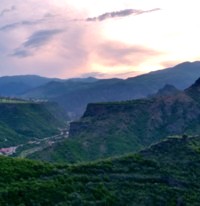Mtskheta
Our next stop was at the fortified Svetitskhoveli Cathedral (the Cathedral of the Living Pillar) at Mtskheta.
The present Cathedral was completed in 1029 but has been damaged on several occasions by earthquakes; Arabs and Persians; and even our old friend from Uzbekistan, Timur.
Under Imperial Russia it was whitewashed damaging the frescos but restoration - as a masterpiece of the Early Middle Ages not as a working church - began in Soviet times.
With the collapse of the Soviet Union religion again blossomed dormant like seeds after rainfall. Across the former Soviet Union religions of all hues have sprung up again, their seeds having survived in the language and culture of the many lands and peoples.
Svetitskhoveli Cathedral it is restored as a fully functioning Georgian Orthodox basilica.
Again Georgian Christians worship, marry, Baptise and are celebrated in death here
As are the faithful of other traditions in mosques, synagogues and temples across the former Soviets, including Russia
There are more images in the Georgia Album See more...
The pillar in its name refers to a structure over the spot at which Christ's last mantle (shirt) was buried, over which an older church was built in the 4th century.
In the days of the monarchy Georgian kings were crowned here and ten are known to be buried here, along with at least one queen.
The pillar under which Christ's mantle lies and a royal grave
Christian Sacraments
The defensive wall that surrounds the Cathedral (featuring gun emplacements and eight towers) was a lively public space around Independence Day and quite entertaining in its own right.
People having fun - the horse was too - out alone on the town
There are more images in the Georgia Album See more...

